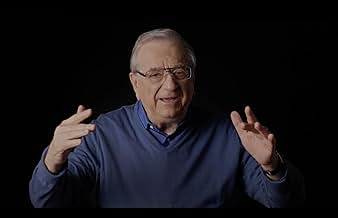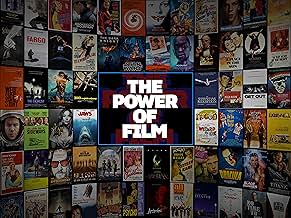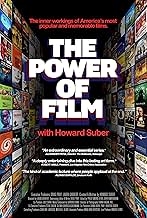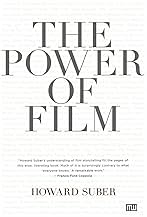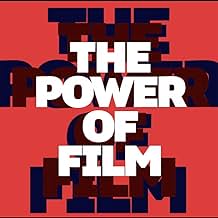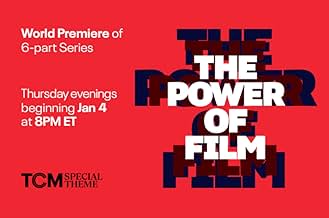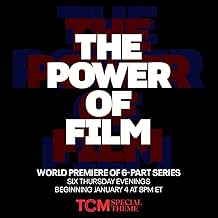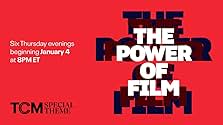Dives deep into the art of storytelling by examining the defining principles and inner workings of the most popular and memorable American films of all time.Dives deep into the art of storytelling by examining the defining principles and inner workings of the most popular and memorable American films of all time.Dives deep into the art of storytelling by examining the defining principles and inner workings of the most popular and memorable American films of all time.
- Star
Browse episodes
Featured reviews
This series offers some interesting things to think about but, it seems the professor's train of thought is all over the place. The same few films from more recent years are used from episode to episode, over and over as examples of what his point is. There are so many other films from the classic era that could have been used instead of so many repeat of contemporary films.
I does contain some interesting insights as to what might create a successful screenplay.
The video image of some of the clips at times has a strobing effect that was a bit off-putting.
I so wanted to love this series but it leaves me a bit flat.
I feel it was a missed opportunity to mine the wealth of film material from the past.
I've seen 5 of the 6 episodes so far.
I does contain some interesting insights as to what might create a successful screenplay.
The video image of some of the clips at times has a strobing effect that was a bit off-putting.
I so wanted to love this series but it leaves me a bit flat.
I feel it was a missed opportunity to mine the wealth of film material from the past.
I've seen 5 of the 6 episodes so far.
I reckon the title speaks for itself. Dozens of movies are interpreted and dissected in this docuseries, but that's absolutely not the point. At least not in my opinion. I've never been driven to write a review on a movie/show/whatever, but please go into this series understanding that this is a narrative on storytelling in general. If you love films with a passion that transcends every single other form of storytelling, you will appreciate this series. Otherwise, read a book about the art of literature. Or listen to an album about the art of music. Or perhaps view a painting about the art of (art?). This is for film lovers, made by film lovers, told to you by a film lover. And now reviewed by a film lover.
Hopefully this is read by a film lover.
Hopefully this is read by a film lover.
Wow.
This documentary gives us the screenwriting essentials. If you are a serious storyteller, it's a "must see.".
UCLA Professor Howard Suber gifts us with wisdom, from a lifetime of teaching graduate level screenwriting, at the top film school in the world.
Perfectly edited for the general public.
In Prof. Suber's honor, UCLA film students coined the term "HOSH Pivot." Which is an acronym for "Howard Suber's One Hour Pivot," spelled backwards. HOSH means the plot takes a dramatic turn, one hour into the film. Which is a key structure of every great film. Once you've a created a new vocabulary word, you're established as a historical figure.
This documentary is a treasure. Which should be replayed again and again.
This documentary gives us the screenwriting essentials. If you are a serious storyteller, it's a "must see.".
UCLA Professor Howard Suber gifts us with wisdom, from a lifetime of teaching graduate level screenwriting, at the top film school in the world.
Perfectly edited for the general public.
In Prof. Suber's honor, UCLA film students coined the term "HOSH Pivot." Which is an acronym for "Howard Suber's One Hour Pivot," spelled backwards. HOSH means the plot takes a dramatic turn, one hour into the film. Which is a key structure of every great film. Once you've a created a new vocabulary word, you're established as a historical figure.
This documentary is a treasure. Which should be replayed again and again.
A collection of movie clips overlaid by narration which is shallow, says pretty much nothing of value and often contradicts itself. The professor will name a "pattern" (usually the vaguest possible theme like "family") and then proceed to illustrate it with examples of movies, hilariously including some, which do not actually feature the stated "pattern" at all.
You are better off watching amateur film montages on youtube, at least they focus on the movies themselves and do not add pretentious, yet meaningless voiceover.
The attempted analysis is very superficial and sometimes almost sounds like a parody. Like this gem of deep thinking: "It was a fatal accident, so it must have something to do with fate". Definitely a fine example of "those who cannot do, teach".
You are better off watching amateur film montages on youtube, at least they focus on the movies themselves and do not add pretentious, yet meaningless voiceover.
The attempted analysis is very superficial and sometimes almost sounds like a parody. Like this gem of deep thinking: "It was a fatal accident, so it must have something to do with fate". Definitely a fine example of "those who cannot do, teach".
Mind-numbingly boring and shallow, Professor Blabbermouth takes us into the world of film with nothing new to say while stating the incredibly obvious. If we only had to rely on what this guy says, I doubt anyone other than his immediate family would make it through this (I dropped out after one episode). There are a million film clips that prop up this bore, but they aren't enough to add up to entertainment. The first episode is completely all over the place and makes not much of a point, and the point made isn't much and hardly warranted forty minutes to tell. He should just write down his point on a 3X5 index card and let viewers watch a real movie.
Details
- Color
Contribute to this page
Suggest an edit or add missing content

